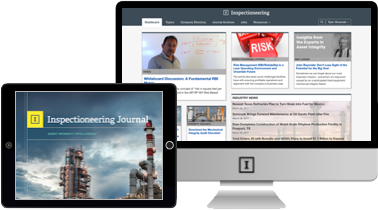Abstract
As refiners continue operating aging infrastructure, safe operation and equipment availability continue to be key components of a sustainable operation. When considering optimizing inspection projects, more and more refiners are making Risk-Based Inspection (RBI) an integral part of their plan processes. When applied properly, RBI can focus inspection efforts using risk as a basis for prioritizing and managing an in-service inspection program. A Joint Industry Project for Risk-Based Inspection (RBI JIP) was initiated and managed by API within the refining and petrochemical industry in 1994. The work of this JIP resulted in two publications, API 580 Risk-based Inspection and API 581 Risk-Based Inspection Base Resource Document. The concept behind these publications was for API 580 to present the principles and general guidelines for RBI while API 581 provides the quantitative RBI methodology. The key concept in RBI methodology is the systematic determination of the probability and resulting consequence of an undesirable event.
Over the course of 3 years, the principles of API 580 and the technology of API 581 have been successfully applied to majority of the process units at the Illinois Refining Division (IRD) of Marathon Petroleum Company located in Robinson, IL. Through planning, training and plenty of hard work, the RBI program at IRD has been successful. This paper provides an overview of the concepts in API 580 and API 581, a discussion on the steps taken to lay the groundwork for the RBI program to be successful, examples of where the program has been successful, and plans for the future.
Introduction
With the introduction 29 CFR 1910.119, the concept of Process Safety Management (PSM) was made a requirement to the refining and petrochemical industry. Specifically element (j) of this regulation sets minimum requirements of a mechanical integrity program for the processing of hazardous materials. A Joint Industry Project, initiated and managed by API, was started in 1994 to develop a Risk-based methodology for determining inspection frequencies and methods. This JIP developed two documents, API RP 580, Risk-Based Inspection [1] and API RP 581, Risk-Based Inspection Technology [2], to guide Risk-Based Inspection implementations. The goal of both of these documents is to reduce overall risk while optimizing inspection activities.
The Illinois Refining Division (IRD) of Marathon Petroleum Company LP located in Robinson, IL started a new mechanical integrity/inspection initiative in 2009. The original goal of the RBI initiative was to supplement the existing time based inspection intervals defined in API 510 and focus their inspection efforts. Over the past 3 years, an initial RBI analysis has been completed on the majority of process units at the facility. Through training, planning and scheduling, the RBI program at IRD has had a successful implementation. The RBI program is believed to have reduced operating risk, optimized inspection activities, and created a forum for information sharing. As the API 581 methodology has been applied at IRD, this paper will focus on these principles.
RBI Concepts
Background
There are two industry documents that guide Risk-Based Inspection programs. The first is API RP 580, Risk-Based Inspection, which defines an RBI assessment. This document provides the basic elements and requirements for developing and implementing an RBI program for fixed equipment. RP 580 is intended to supplement existing inspection codes (API 510, API 570, and API 653) related to increasing or decreasing inspection frequencies. These inspection codes have provisions that allow an RBI analysis to establish inspection plans for fixed equipment in the refining and petrochemical industry.
The second edition of API 580, November 2009, specifically requires that an RBI assessment must “systematically evaluate both Probability of Failure (POF) and the associated Consequence of Failure (COF).” In most processing plants, a large percent of the total unit risk will be concentrated in a relatively small percent of the equipment items. These potential high-risk components may require greater attention with a more sensitive inspection technique or greater inspection coverage.

















Comments and Discussion
There are no comments yet.
Add a Comment
Please log in or register to participate in comments and discussions.